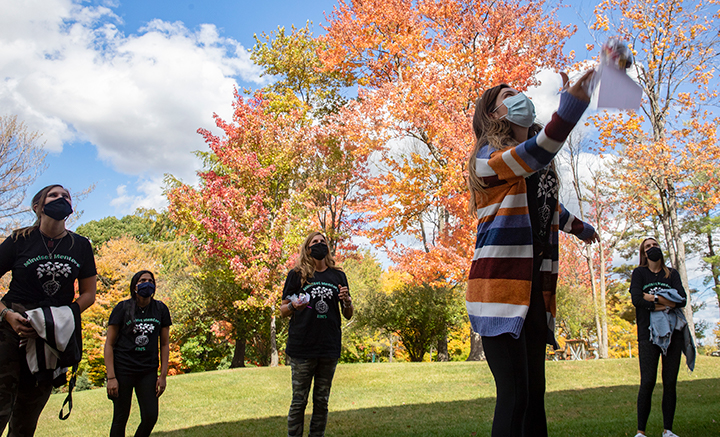Mindset Mentors help struggling students

While so many Binghamton University programs have been reduced in their capacity to interact with students as a result of the pandemic, one group of students is determined to help others during this difficult time.
The “Mindset Mentors” program is spearheaded by Jennifer Wegmann, a health and wellness studies (HWS) lecturer within the University’s Decker College of Nursing and Health Sciences. The goal of the eight-member group has been to promote a working understanding of a healthy “stress mindset” and provide students with tools to help them deal with their stress, this semester in particular. All the Mindset Mentors are working toward a minor in health and wellness studies, which has given them a wealth of information to pass onto others.
Wegmann has been teaching about the stress mindset for a long time in her stress management classes and believes every student can benefit from this information, regardless of whether or not they’ve taken those classes. For her, the internship was the perfect opportunity to provide students with real-world wellness experience, while also helping a struggling student body.
“The rationale for creating the internship was two-fold,” Wegmann explained. “First, it was facilitated by the desire of the Student Well-being Task Force to develop a plan to help students foster positive moods, resilience and healthy relationships. Second, the HWS department saw a need for peers to be able to engage in educational and outreach opportunities within our campus community.
“We know that all the things we talk about in stress management — whether it be gratitude, mindfulness or social connection — are leading us to be more resilient,” she added. “What the mentors are embracing, and one of the things that we’re trying to tell everyone, is that we all have the capability to be resilient.”
The group has been running an Instagram page (@bu_mindsetmentors) that posts daily mental health information and helpful resources for students. The page also dedicates different weekdays to discussing particular topics: Mindful Mondays, Time Management Tuesdays, Wellness Wednesdays, Thankful Thursdays and Fitness Fridays. They also create and post Doodly videos (animated drawings voiced by the students) every two weeks that focus on a particular topic in stress management and have reached out to in-person classes for presentations.
Grace Schaefer, a junior nursing student, first got involved with the project after taking Wegmann’s class. Schaefer said the class changed her perspective on managing her stress and her college experience, which inspired her to join Mindset Mentors.
“There’s scientific reasons behind why we feel the way we do, and we don’t treat stress as a motivating factor or as something that needs to be thought about consciously,” Shaefer said. “I’ve always just thought of stress as a side effect of being involved in things, something that happens, not something I can take an active role in.”
While COVID-19 has left many feeling isolated and alone, the Mindset Mentors are working to help the students who may be suffering the most. Any student on Binghamton University’s campus who tests positive for the COVID-19 virus has to move to an isolated room on campus to avoid the risk of spreading the disease (unless the student decides to isolate at home). While these measures keep students and the community safe, spending so much time alone only exacerbates the stress the students already feel. The Mindset Mentors visit the students in isolation, talking to them from outside the building to make them feel less alone.
Alyssa Wengrofsky, a senior political science major interning in the program, runs Fitness Fridays and got to see firsthand just how much it means to students.
“If I could just help one person see their situation differently, it would mean a lot,” she said. “We’ve been writing letters and bringing candy to people in isolation and quarantine, and I think people have been really appreciating it. Somebody emailed Jen [Wegmann] the other day thanking us for the letter — it’s our way of giving out something more personal.”
Sadie Macklem, a senior psychology major, said helping others through the Mindset Mentors program is fulfilling. She also said she has benefitted as well.
“Over the summer my dad died. When I heard about the Mindset Mentors, I saw it as a really great opportunity to use what I’ve learned, not only to help myself, but also to help other people on campus.” she said.
Macklem runs the Thankful Thursdays portion of the group’s Instagram and is a resident advisor for Binghamton’s College-in-the-Woods residential community, something she intends on incorporating with her work for the HWS internship. She also runs the SEEK (Support, Empathy, Empowerment, Kindness) helpline for students in need of immediate support.
“It’s nice because I have an up-close picture of how the student body is feeling,” Macklem said. “There’s a grief there; it’s the loss of their college experience, especially for [first-year students]. One day I can hopefully bring in the Mindset Mentors and do a community builder for my residents.”
The program will continue with a new group of eager students in the spring, and while it’s clear that no one knows exactly what the world will look like, it’s certain the Mindset Mentors will be there to lend a hand.
